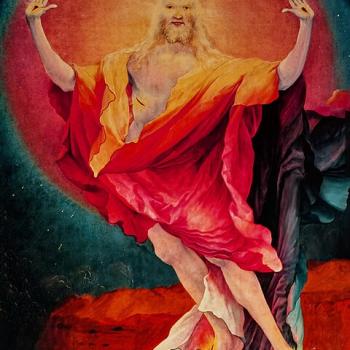Editor's Note: Below is a "Monday Sermon," from our series of sermons at the Patheos Preachers Portal that pastors can enjoy and learn from. It is our hope that this particular series from Daniel Harrell, which preaches through the Church Fathers, will encourage pastors, show them a way of approaching theological education from the pulpit, and refresh their theological memories. See Reverend Harrell's columnist page for more information.
 Every now and then, people complain. You know how it goes. Taking stock of your life—your work, your family, your prospects for the future, your relationship, your lack of relationship, or maybe just some recent spate of troubles and worries—can awaken your inner whiner.
Every now and then, people complain. You know how it goes. Taking stock of your life—your work, your family, your prospects for the future, your relationship, your lack of relationship, or maybe just some recent spate of troubles and worries—can awaken your inner whiner.
Christians can be the worst. Because we harbor belief in a God who is good—alongside a frequently self-centered notion of what that goodness looks like—we can convince ourselves somehow that God owes us. Ask, you conclude, and God is obliged to give you the desires of your heart. And if he doesn't, if life ends up not being as you like it, somehow that's God's fault and you complain. You grumble and blame God for allowing your existence to become so pathetic. Eventually some people, ironically, will come to me, an equally pathetic minister, for help. Pity does love company. You'll ask me to venture a guess at the Almighty's design and ponder aloud as to why he would withhold his goodness from you. I respond with compassionate nods and other empathetic gestures signaling that I have no idea.
Yet had the Venerable Bede been the one sitting opposite you and hearing you complain, it's plausible that he too would have leaned toward you with a caring gaze, only to sternly admonish you to shut your trap—in love, of course. Indeed, if as this Church Father insisted, all saints, angels, patriarchs, prophets, and martyrs upon approaching the throne of Christ are stunned into silence by his glory, why then are you saying anything? "No words are able to speak," he wrote, "that beauty, that virtue, that glory, that magnificence, surpasses every expression, every sense of human mind. And if to attain to that ineffable sight and to be made radiant with the splendor of Christ's countenance it were worthwhile for you to suffer torment every day—if it were worthwhile for you to endure hell itself for a season, so that you might behold Christ coming in glory, and be joined to the number of the saints—is it not then well worthwhile for you to endure [mere] earthly sorrows that you may be partakers of such good and of such glory?" Uh, I guess so.
Bede is one of the few Church Fathers with an adjective tacked on to the end of his name. "Venerable," meaning worthy of reverence and respect, was associated with Bede within two generations after his death. Legend has it that some dimwit monk in charge of chiseling an epitaph on Bede's tomb couldn't figure out what to inscribe after Bede's name, so he decided to sleep on it. The next morning he awoke to find that angels had filled in the blank with "the venerable." I asked a few friends what adjective angels might tack onto my name if I was ever a church father. Their consensus was that a) I would never be a church father but that b) if I was, something along the lines of "Daniel the Flippant" would fit.
Bede the Venerable was born around 672 and lived until he was 63 years old. In the last chapter of his magnum opus, the Ecclesiastical History of the English People, completed four years before he died, Bede described his own life, which, as it turns out, is basically all that we know. With rare exception Bede's life seems to have been one peaceful round of study and prayer lived out in the small perimeter of his monastic community. That he was deeply loved by his community is made evident in the account of Bede's final illness recorded by one of his students. "I can with truth declare," wrote the student, "that I never saw with my eyes or heard with my ears anyone return thanks so unceasingly to the living God."
On the day of his death in 735, Bede was still busy dictating a translation of the Gospel of John. In the evening, his scribe remarked, "There is still one sentence, dear master, which is not written down." Upon supplying this sentence, the scribe informed Bede that it was now finished. "Thou hast spoken truth," Bede answered, "it is finished. Take my head in thy hands for it much delights me to sit opposite any holy place where I used to pray, that so sitting I may call upon my Father." The scribe helped Bede to the floor of his room where singing "Glory be to the Father and to the Son and to the Holy Ghost" he peacefully breathed his last breath.





